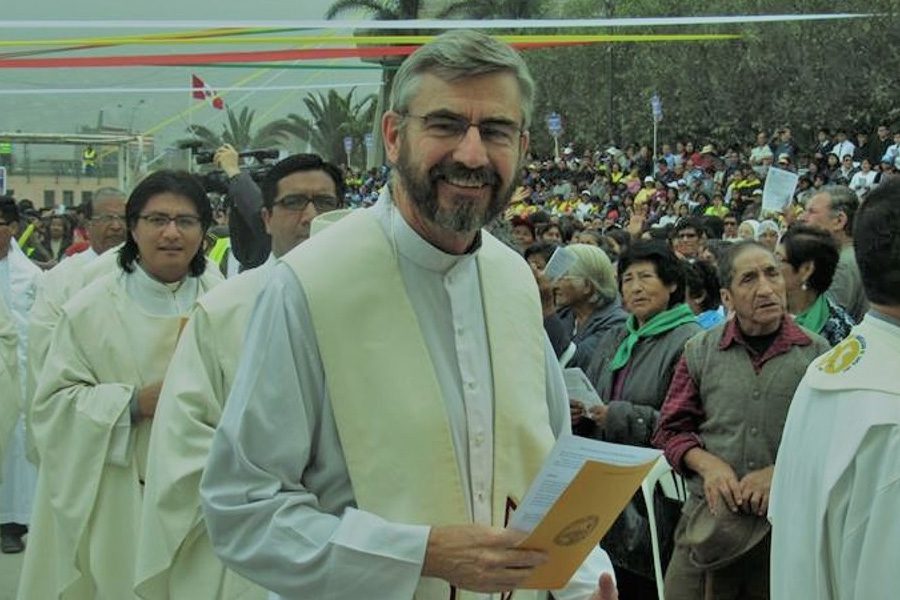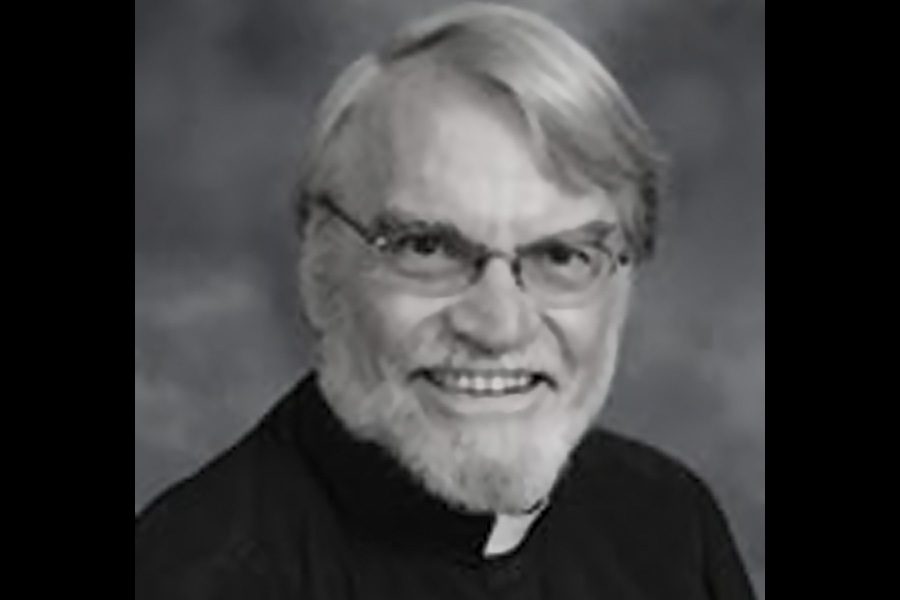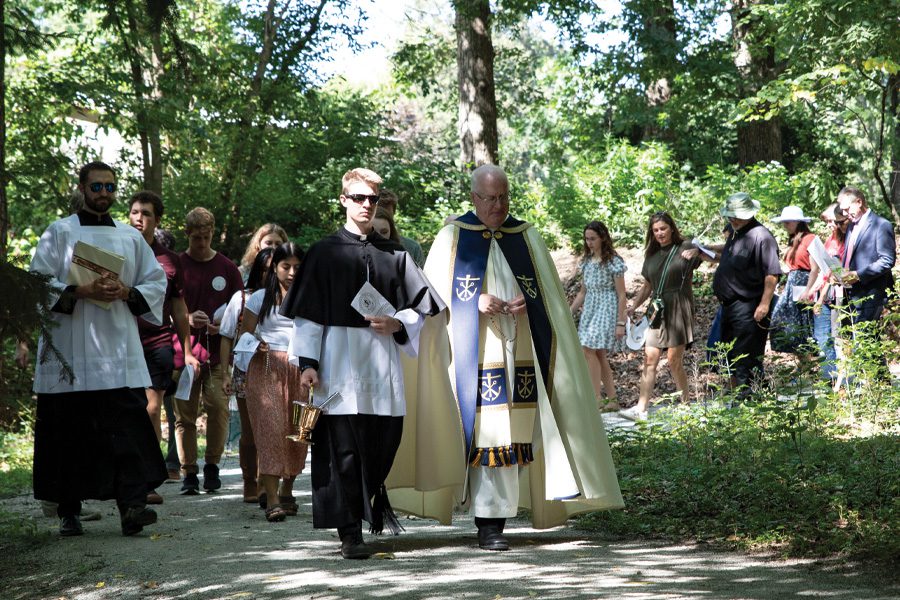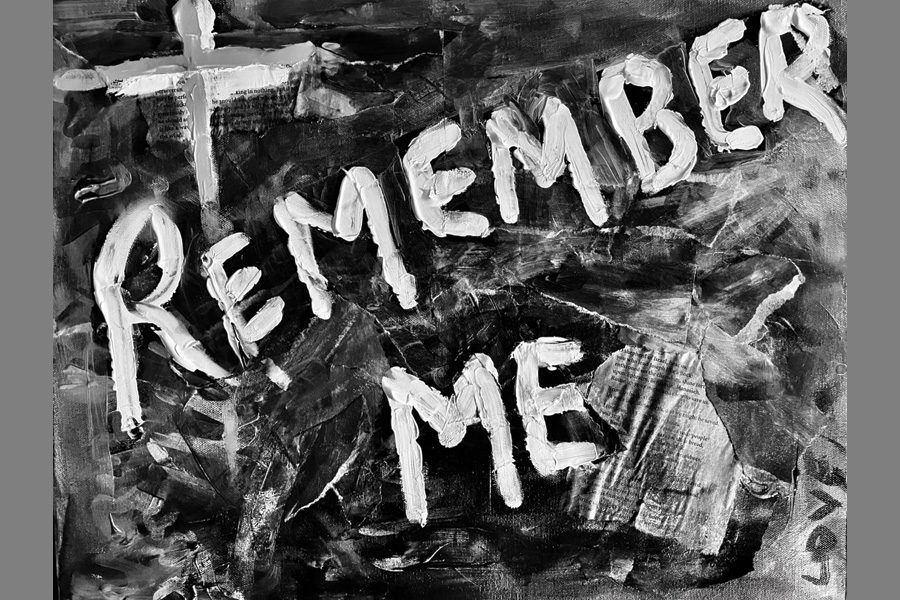The plight of the teenage years can be an emotional roller coaster for families. Peer pressure, anxiety, and academic stress turn families into strangers and home life into a battle zone. Imagine all those pressures accompanied by a language barrier and cultural ignorance from the community. That was the situation found on the west side of South Bend, Indiana, in the 1970s by Rev. John P. Phalen, C.S.C. This awareness led him on the journey to begin La Casa de Amistad, an organization that empowers Hispanic youth and their families to thrive in the world while nurturing a deep pride in their cultural roots.
Fr. Phalen’s journey of cultural empathy and empowerment started after a revelation on a trip to Peru. Accompanied by a fellow Notre Dame student, and with a limited understanding of the Spanish language, they worked at a parish. The language barrier gave him insight into the stress of communication barriers. The experience of adapting to a different culture had a lasting impression.
The Journey
“It changed me a lot. I remember on the plane back to South Bend I had this tremendous feeling that this was what God wanted me to do, as opposed to what I’d been thinking of doing which was to be a professor of literature in one of our universities. I love literature and all, but these were real-life people that I really got along well with, and I found I was so interested in their culture, their way of life, and the people themselves. And so, I decided that I probably want to go to Peru eventually, but that I should start working with Hispanics right in South Bend, Indiana,” said Fr. Phalen about his first experience with the Hispanic community.
After returning from Peru, he was invited to be a musician for the Spanish Masses at St. Stephen’s Parish in South Bend, Indiana. At this time, Fr. Phalen was discerning where he wanted to do ministry work and the area to serve, finding himself drawn to work with the Hispanic community. Rev. Peter Forrestal, C.S.C., was a Spanish teacher at Notre Dame asked Fr. Phalen for assistance in ministering pastoral and social needs to Hispanic families.
Upon the blessing and recommendation of Fr. Forrestal to “take care of my Mexicans” as he retired, the trio of Fr. Phalen, Rev. Thomas F. Lemos, C.S.C., and Rev. John S. Korcsmar, C.S.C., began concentrating their efforts on the Hispanic community. Their first goal was to get the administration at Moreau Seminary to agree to let the men move to a home in the neighborhood to minister to the community while finishing their studies.
“One rector said yes, it was all set to go, and then they voted in another rector,” shared Fr. Phalen about the negotiations to move off campus. “So, we had to do the same thing all over again; convince him that we were trustworthy, that we would live poorly, and we wanted to be closer to the people.”
Every Sunday, Fr. Phalen would get a ride back to Moreau Seminary and was embarrassed at how the people he ministered to were living in very small homes, while he resided in what looked like a five-star hotel to them because of the large building. Working and staying in the neighborhood was the best way to connect to the community, and they were given permission and a budget to make that dream a reality. He and fellow students worked at St. Stephens Parish, continued their studies, progressed through the formation process, collaborated with lay people on pastoral work, and lived in a house near the Hispanic community on Birdsell Street in South Bend, Indiana.
One of the ways Fr. Phalen introduced the Hispanic culture to the area was through a music group called La Vida. The La Vida singers would go out to different locations – social groups, Catholic and non-Catholic church groups – to bring a taste of the Hispanic culture to Americans. Fr. Phalen discovered a need for youth-focused services. With the assistance of Fr. Lemos, members of La Vida,
and lay collaborators like Benito Salazar and Ernie Hernandez, La Casa de Amistad was born.
“A woman came to town by the name of Liz Connor, and she was an expert in bilingual education. She had worked for bilingual education in Indianapolis, moved to South Bend, and immediately got interested in La Casa de Amistad,” recalled Fr. Phalen. Programs were
designed and created allowing them to visit the schools and the Hispanic students in various classes, collaborating with them on adjustment techniques with the English-speaking students. That outreach turned into opportunities for them to discuss Hispanic traditions with teachers to help them better connect with their Hispanic students.
“I used to have kind of bilingual sessions with the students and sessions explaining the culture to the people who were teaching, and that was well accepted,” said Fr. Phalen. “An example would be, I would tell them in English, ‘I dropped the pen.’ It’s my fault. I dropped the pen. In Spanish, it’s the contrary regarding the blame: ‘The pen dropped itself from me.’ In other words, the pen is at fault. It just jumped out of my hand onto the floor so there is this no-fault kind of theory in Hispanic culture where you never talk about anybody being guilty of something. You talk about the guilt is in the thing, not in the person. Whereas in English, you did it and, in Spanish, the pen dropped itself out of my hand.”
“Another example would be when the teacher is trying to chew out a student, and the student keeps looking at the floor. The teacher says, ‘Look at me when I’m talking to you. You did this wrong. You have to do this.’ Well, that student has been taught all his life that when he is being corrected, it would be disrespectful for him to look in the eyes of the person who is angry with him. He would have to look at the floor and be humble. So that is what he is taught to do. And then he gets chewed out for looking at the floor because he doesn’t understand the Anglo culture, and the Anglo culture doesn’t understand him,” shared Fr. Phalen of another example of cultural miscommunications that he and Liz Connor worked at combatting in their visits.
The core team began creating opportunities for Hispanic youth to get involved. A Boy Scouts of America: La Casa de Amistad division started. Tutoring sessions, a choir, a baseball team, and after-school assistance ignited tremendous impact and growth within the Hispanic community. They also identified needs for families and started a food pantry out of the garage since they were the only organization for Hispanics that was in existence at the time. It was a necessity for people just arriving in the area. With a collaboration between professionals trained in mental health, they were able to provide counseling for parents and families.
By around 1977, the organization had grown significantly and needed a larger location to house all their outreach efforts. After numerous fundraising projects and grant proposals, enough funds were raised to move to the 746 Meade Street location. With a larger facility, more programs could be introduced to the community.
Sisters Mary Ann Pajakowski, C.S.C., and Suzanne Brennan, C.S.C., lived and worked on the second floor and oversaw a Girl Scout program. Mary Mullaney (Kearney), a law student at the University of Notre Dame, was one of the first consistent volunteers. She, and others she recruited, worked with students to keep them academically on task. As children of migrant workers, they moved around, often missing school and falling behind in studies. The volunteers found methods and strategies to keep the students moving forward.
Lasting Impact
Translated as The House of Friendship, the organization continues to grow. It is now located in a 40,000 square-foot building with providing educational, cultural, and advocacy services.
Fr. Phalen is proud of the work he and members of his team did to create such an impactful organization in the South Bend, Indiana, area. Today, his ministry work has taken him back to Peru where he is the Associate Pastor at Parroquia El Señor De La Esperanza (Our Lord of Hope Parish).
“I like to draw people closer to God, and I think there are many different ways to do that. Jesus Christ is who we were all about when La Casa de Amistad was born; our great motivation,” shared Fr. Phalen. “In our La Vida singing group, we would sing a lot of religious songs. We would also sing a lot of secular songs, songs I had learned in Peru, and songs we would pick up from anywhere. We loved music. We would practice every week and would do these different presentations on music and culture and there is a faith dimension in that too. I have always found that belief is strong when working with the poor; you have people who know that they need God today, if only because they do not know where the next meal is coming from, or because there are economic difficulties, problems in the family, employment issues, language challenges, or acceptance of culture issues. I want to help them in their prayer relationship with God and with their concrete needs. I want them to know that God accompanies them and makes the services of La Casa de Amistad available to them still through its caring and competent staff. God loves them and is active in every culture and always accompanies his people.”
Published August 2024




